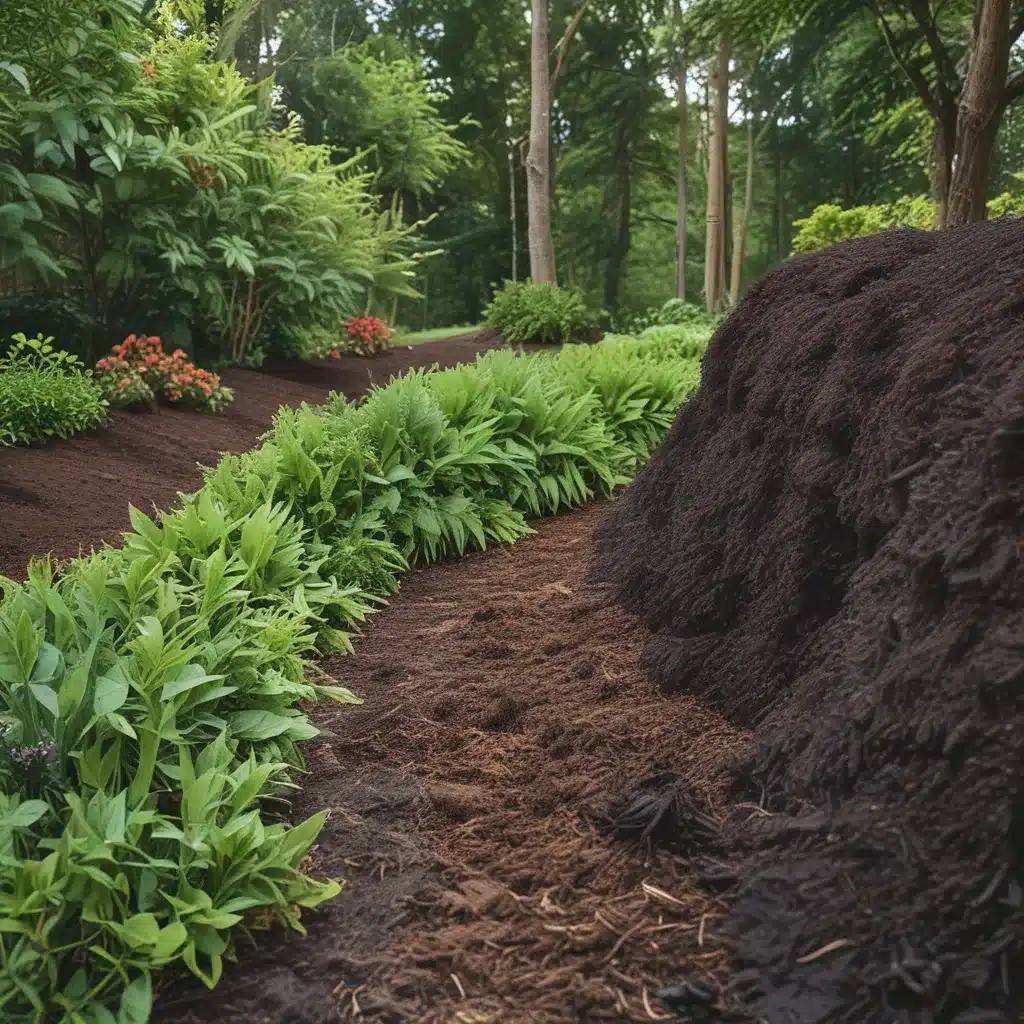The Power of Mulch
If there’s one thing I love almost as much as compost, it’s mulch. Why, you ask? Well, let me tell you – mulch is the unsung hero of the gardening world. It protects the soil from the elements, improves drainage, and reduces the need for pesky weeds. And let’s not forget, it just plain looks nice.
You see, an exposed soil bed, especially in a raised bed, is just begging to dry out. It can develop that dreaded crusty layer that’s resistant to water, and the exposed soil can even blow away. But mulch? Mulch solves all of those problems. A one or two-inch layer of natural materials like wheat straw, arborist wood chips, or my personal favorite – shredded leaves – is all it takes to keep that soil happy and healthy.
And the benefits don’t stop there. Mulch also significantly reduces weed growth. Why? Because it blocks the sunlight that those pesky weeds need to thrive. Plus, as the mulch breaks down over time, it adds valuable nutrients back into the soil. It’s like a never-ending cycle of soil improvement.
But don’t just take my word for it. I’ve seen the difference mulch can make firsthand. When I was filming my DIY Network series “Fresh from the Garden,” I made sure to keep all of my raised beds mulched to perfection. And let me tell you, the results were nothing short of spectacular. Lush, vibrant plants that seemed to thrive without any extra effort on my part. It was like having a secret weapon in my gardening arsenal.
The Magic of Compost
Now, if mulch is the unsung hero, then compost is the rock star. It’s the foundation upon which we build our healthy landscapes. You see, when it comes to soil, we gardeners need to think of ourselves as engineers. We’re not just plopping plants in the ground and hoping for the best – we’re creating an entire ecosystem below the surface.
And the key to that ecosystem? Compost. It’s the lifeblood that feeds the billions of microorganisms, earthworms, and other critters that call our soil home. These little guys are busy at work, breaking down organic matter and making nutrients available to our plants. Without them, our gardens would be doomed to wither and fail.
That’s why I’m so passionate about compost. I’ve seen firsthand how it can transform even the most lifeless, compacted soil into a vibrant, fertile oasis. And the best part? It’s not rocket science to make your own. All you need is a little patience, a few key ingredients, and a bit of know-how.
Now, I know what you’re thinking – “But Joe, I don’t have the time or space to compost!” Well, fear not, my friends. There are plenty of ways to get your hands on high-quality compost, even if you’re not a DIY master. A1 Landscape Construction in Temecula, California, for example, offers a wide range of compost products that are perfect for amending your soil.
The Winning Combination
So, let’s recap. Mulch and compost – the dynamic duo of the gardening world. Mulch protects your soil, reduces weeds, and adds nutrients as it breaks down. Compost, on the other hand, is the foundation of a healthy soil ecosystem, feeding the microorganisms that keep your plants thriving.
But the real magic happens when you combine the two. Imagine a raised bed, its soil bursting with life from a generous helping of compost, and a cozy layer of mulch on top to lock in moisture and prevent erosion. It’s a gardener’s dream come true!
And you know what the best part is? It’s not complicated at all. Just a few simple steps, a bit of elbow grease, and you’ll be on your way to gardening success. So, what are you waiting for? Get out there, get your hands dirty, and let the power of mulch and compost transform your landscape into a lush, thriving oasis.
The Importance of Soil Testing
Of course, as with any good gardening endeavor, we can’t forget the importance of soil testing. After all, how can we expect to build the perfect soil ecosystem if we don’t know what’s already there? That’s why I always recommend getting a soil test, especially when you’re starting a new raised bed or revamping an existing one.
A soil test will give you the lowdown on your soil’s pH, nutrient levels, and even the presence of any pesky contaminants. Armed with that information, you can then tailor your compost and mulch applications to address any deficiencies or imbalances. It’s like having a roadmap for your gardening journey – it just makes the whole process a whole lot smoother.
And the best part? Soil tests are actually pretty affordable, usually costing around $20-$30. You can even get them done through your local extension office or a reputable lab. So, what are you waiting for? Get that soil tested and let the soil-building magic begin!
Continuous Improvement
Now, I know what you’re thinking – “But Joe, what if I’ve already got some raised beds set up? Do I really need to start from scratch?” Absolutely not! In fact, one of the joys of gardening is the process of continuous improvement.
Even if your raised beds have been chugging along for years, there’s always room for a little TLC. All it takes is a fresh layer of compost and mulch to breathe new life into those tired old beds. And the best part? You don’t even have to dig them up or start over. Just top-dress the surface and let nature take its course.
Over time, as your plants grow and the soil microbes do their thing, that compost and mulch will work its way down, improving the overall structure and fertility of your soil. It’s like a never-ending cycle of soil rejuvenation. Year after year, your beds will just get better and better, with each harvest more bountiful than the last.
So, don’t be afraid to experiment, try new things, and keep tweaking your garden formula. That’s the beauty of gardening – it’s a never-ending journey of discovery and growth. And with the power of mulch and compost on your side, you’re well on your way to creating a landscape that’s not just beautiful, but truly healthy and sustainable.
The Joys of Automation
Now, I know what you’re thinking – with all this talk of compost and mulch, gardening must be a ton of work, right? Well, let me let you in on a little secret: it doesn’t have to be.
You see, these days, there are all sorts of nifty tools and gadgets that can help automate the watering process, taking the guesswork (and backbreaking labor) out of keeping your plants happy and healthy. Things like drip irrigation systems, soaker hoses, and even battery-operated timers can make watering a breeze, no matter how busy your schedule might be.
And the best part? These systems are actually pretty affordable and easy to install, even for the DIY-challenged among us. All it takes is a quick trip to the home improvement store, a few basic supplies, and voila – you’ve got your very own state-of-the-art watering system, custom-tailored to your raised beds.
Of course, I’ll always have a soft spot for the good old-fashioned hand-watering method. There’s something incredibly soothing and therapeutic about standing there, wand in hand, gently delivering water to each and every plant. But let’s be real – sometimes, life gets hectic, and it’s just not possible to be out there with the hose every single day.
That’s where these automated systems come in handy. They ensure your plants get the water they need, without you having to sacrifice your precious free time. And let me tell you, there’s nothing quite like the feeling of coming home to a thriving, well-watered garden, all thanks to a little bit of technological wizardry.
The Wrap-up
So, there you have it, my friends – the secret to a healthy, thriving landscape is all about the power of mulch and compost. These two gardening superstars work hand-in-hand to create the perfect growing environment, nurturing your plants from the roots up.
And the best part? It’s not as complicated as it might seem. With a little bit of know-how, some elbow grease, and maybe a few nifty gadgets, you too can transform your outdoor space into a lush, verdant oasis. So, what are you waiting for? Get out there, get your hands dirty, and let the magic of mulch and compost work its wonders!




